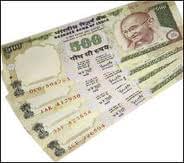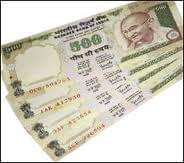Commentary
Political economy of Corruption-A real TN case study
Dhruvan
May 16, 2011, 12:18 PM | Updated Apr 29, 2016, 03:04 PM IST
Save & read from anywhere!
Bookmark stories for easy access on any device or the Swarajya app.


Groundswell of popular support for Hazare movement reflects an increasing anger against corruption that threatens to eat in to the vitals of our society. Moral indignation manufactured by the middle class protestors, manifested in sloganeering like “Mera Neta Chor hai”, briefly threatened to become the national war cry during the interregnum between World Cup and IPL. It’s easy to succumb to current fetish for facile damning of the complete political class as corrupt but it would be interesting to pose a counter intuitive question. Given the consequent erosion of credibility, infamy associated with televised visits to courts as part of long drawn judicial fight and possibly a brief jail term, would a politician willingly indulge in activities that bring shame to him. Are there deep rooted structural issues which incentivize financial impropriety in politics?
The answer to this can be obtained if we analyze the period in which a party worker gestates in the corridors of power. For this a little understanding of power structure in political parties is required. District level unit is pivotal aggregate around which organizational structure of most political parties (with minor variation) are build. Each district has a chief, who has a great say as far as the local affairs are concerned. The second rung leaders and MLA aspirants of the particular district largely operate under the command of district chief. MLA aspirants have to listen to the district chief’s diktat and work, rather spend accordingly. It’s the district chief who recommends the name of probable contestants in a particular district to the party supremo or parliamentary board or politburo or high command. The tasks of district chief mainly focuses on organizing boisterous protests if the party is in the opposition ranks or stage propaganda campaigns to highlight the ‘achievements’ of the government if they are ruling. This activity entails great deal of expenditure. District chief delegates these jobs to the aspirants. They have to mobilize participants, provide food, organize musical extravagances for entertainment before meet actually begins, and transport them back with some hard cash in their hand for the effort expended. The state leadership keeps a close tab on activities of the leaders-leaders who have the monetary wherewithal to spend obviously attracts the attention of the party vanguard
As election approaches the probable list is dispatched to state leadership by the district chiefs. Once the aspirants come to know they have made to the shortlist they seek the services of power brokers and influential lobbies to make sure they are the chosen one in their respective constituencies. Many charlatans and fly by night operators claiming access to leadership pocket the money duping the naive. Additionally business houses too queer the pitch by exerting influence on the party leadership to get their own cronies fielded in the fray. The one who succeeds to cross the bridge probably at this juncture is unaware that real expense starts from here(of course we have seasoned political campaigners who could realize this). Now the game begins.
The candidate starts slow, with a tendency to be very miserly with money, unsure of electoral prospects at the hustings. Soon he realizes that party workers don’t show any enthusiasm to work for him. Suddenly realization dawns on him that D Day is approaching and lack of political energy in his camp will be disastrous. So he decides to loosen his purse strings. He generously spends money for his workers and his alliance party workers. Naturally workers get energized and folks starting flocking to party office citing multifarious reasons to extract their share of pie. The candidate has no option but to oblige else his investment is sure to go down the drain. He cannot afford a rebellious cadre in eleventh hour which will simply mean an electoral catastrophe
As the polling day nears task becomes more onerous.First checking voter’s name in list, second planting spies in rival camp to provide competition intelligence on where money is getting distributed for votes and third organize teams of ‘able-bodied henchman’(euphemism for local goondas) to catch the rival campers who distribute money. These three tasks require considerable energy and manpower. Obviously the amount spent here will be have to be astronomical unless you have huge network nurtured and in place already.
Alas! The polling is finished but the expenses don’t. Candidate has to organize a big party to all of them who helped in his mission to become the MLA and serve the masses.
If we do a rough calculations on the spending a typical candidate would have spend at least INR 50 million. This includes a sum of INR 50000 he has to give for each ward in the constituency blindly. It does not include the amount he had spent pre election period. Let us put the amount he had spent before elections are announced at INR 10 million. The total investment will be INR 60 million
Okay. Investment over. Now the returns. In Corporate speak ROI!
The salary of a legislature is roughly INR 50000 per month which comes to INR 600000 p.a and he will earn INR 3 million in the whole tenure. He has to spend for his family survival, attend weddings, travel etc with this money. After investing INR 60 million how can we expect this person to keep quiet with such lowly returns? Also the source of his investment will be either his own or liberal funding some corporate house. If it’s from some corporate house he needs to justify their investment by doling out some undue favors. If it’s his own its makes little sense to ask him to spend so much every five years as he needs to generate sufficient funds again to stand in the next election! A better idea will be forming a trust if he wants to share his money with the poor.
You may argue if he had done well for his constituency why he should be spending again?. Gentle readers-this logic has not worked in most of the cases if you take pain to remember how many do gooders have bit the dust. Also if rival camp puts a strong candidate (read wealthy) this logic never works! It has become a necessity to spend more to get noticed more among the masses. At the most he may start with an advantage.
Investment cycle is 5 years and the person will start from day one finding ways to refill his bank balance. Where has this investment gone? It has not gone to him or his family but to the pocket of a common man disguised as a party worker!
QED :Corruption starts when politics began to be seen as a business rather than social service
PS-Dhruvan is a political observer in his free time and wrote this exclusively for CRI based on his discussion with a political worker of a mainstream Dravidian party





